|
|
|
Sort Order |
|
|
|
Items / Page
|
|
|
|
|
|
|
| Srl | Item |
| 1 |
ID:
072790
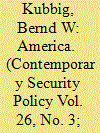

|
|
|
|
|
| Publication |
2005.
|
| Summary/Abstract |
This article traces the development of the post-Cold War American discourse on ballistic missile defences from its arms control supportive stance during the first Clinton administration to the abandonment of the ABM Treaty in 2002. It shows how military primacy and the absence of a peer competitor enabled conservative opponents of the ABM Treaty to change the discourse on National Missile Defense. Especially after the landslide victory of the Republicans in the 1994 congressional elections, national missile defence became politically driven, reducing the influence of more moderate forces on the debate. The 1998 Rumsfeld Report and the missile test by North Korea in the same year led to the Senate vote in 1999 to go ahead with a national missile shield. Neoconservatives dominated the agenda and the ABM Treaty was doomed. The article concludes with a review of the current missile defence testing programme. It suggests that contrary to the expectation of realizing post-Cold War primacy, the limits of technology have put more formidable shackles on American unilateralism than the constraints of the ABM Treaty Neoconservatives thought to escape from.
|
|
|
|
|
|
|
|
|
|
|
|
|
|
|
|
| 2 |
ID:
072793
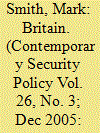

|
|
|
|
|
| Publication |
2005.
|
| Summary/Abstract |
This article highlights four key aspects of British ballistic missile defence policy. These are, first, the Anglo-American connection; second, the participation in American-led 'coalitions of the willing'; third, the role of NATO; and, fourth, the role of the defence industry. These four factors operate inside a strategic culture of 'instinctive Atlanticism' coupled with a Europeanist trend in recent years. Developments in the United States are likely to be more influential in British policy than missile proliferation. An American offer of BMD coverage of the UK homeland, perhaps as part of the American system, might be attractive, but the lack of a strong pro-missile defence constituency in Britain, other than in the defence industry, probably means that it is only in this context that London would make such a decision.
|
|
|
|
|
|
|
|
|
|
|
|
|
|
|
|
| 3 |
ID:
072791
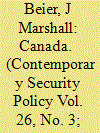

|
|
|
|
|
| Publication |
2005.
|
| Summary/Abstract |
In February 2005 Canadian Prime Minister Paul Martin announced that his government would not partner with the United States on continental missile defence, confounding growing anticipation of imminent Canadian involvement. Predicated on the dominance of economic concerns underscored by a general sense of deteriorating Canada-American relations, these erstwhile expectations discounted the weight of a popular outlook influenced by deeply held identity commitments, something the minority Martin government could ill afford to do. Analysis of identity as a key determinant of Canadian policy in this instance is revealing not only of the sources of the decision taken on missile defence, but also of the centrality of identity performance to Canada's ability to successfully enact its international diplomacies. On these terms, it also finds non-participation in continental missile defence to be well recommended by broader Canadian interests.
|
|
|
|
|
|
|
|
|
|
|
|
|
|
|
|
| 4 |
ID:
072794
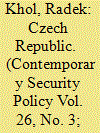

|
|
|
|
|
| Publication |
2005.
|
| Summary/Abstract |
Missile defence is an issue in Czech politics that touches upon the roots of Czech security policy, and combines its vital NATO and US bilateral dimensions. Several factors clearly come into play in explaining the main sources of the debate and the actual course of Czech missile defence policy. Pragve's foreign and security policy is determined by Atlanticist motives, intra-Alliance solidarity and a pragmatic approach towards a project seen as a top priority for the Bush administration. However, the Czech government must be cautious in its missile defence policy as Parliament has considerable influence over the security and defence policy domain. Its core power rests with the constitutional requirement for approval of any stationing of foreign troops on Czech territory, including missile defence installations. As the Czech political scene is divided on this issue we can expect a heated debate on missile defence in the future.
|
|
|
|
|
|
|
|
|
|
|
|
|
|
|
|
| 5 |
ID:
072795


|
|
|
|
|
| Publication |
2005.
|
| Summary/Abstract |
Denmark appeared to be caught in several difficult political dilemmas when the United States government indicated its desire to upgrade facilities at Thule Air Base in Greenland for a role in missile defence. Domestic politics and constitutional relations between Greenland and Denmark were at the heart of the problem. Would a 'Yes' to the American request inflame the movement for independence in Greenland? Would a 'No' leave Denmark, which had earlier opted out of EU defence cooperation, without strong allies? And would a democratic debate on the issue jeopardize a government policy in favour of 'Yes'? After years of consultations, debate and negotiations, approval from both the Greenland government and the Danish Parliament was obtained. Rather than being resolved, the dilemmas were bypassed. The strategic and military issues of missile defence were overshadowed when Greenland used the occasion to take one more step towards independence. In Denmark the remoteness of Thule and a sense that supreme interests are at stake limit public debate.
|
|
|
|
|
|
|
|
|
|
|
|
|
|
|
|
| 6 |
ID:
072789
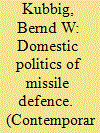

|
|
|
|
|
| Publication |
2005.
|
| Summary/Abstract |
Now that the bilateral perspective of the missile defence issue has become obsolete, its multinational character has more clearly come to the surface. The analyses of this Special Issue deal with the domestic politics of missile defence policy in 16 democratic countries. Among the nine key findings developed here are: the termination of the ABM Treaty has been grudgingly accepted, or cautiously welcomed, with greatest resentments alive in Russia; the United States' territorial shield has strong supporters, but is not broadly legitimized; almost all democracies share a consensus on Theatre Missile Defence for protection of expeditionary forces; the United States is the dominant power structuring the entire missile defence area, although America with all its influence is a necessary albeit not a sufficient factor in explaining the missile defence policies of other democracies. The contributors add three major explanatory factors: the broad foreign policy orientation or political culture, domestic politics and structure, and to a lesser extent the threat perception of the individual democracies.
|
|
|
|
|
|
|
|
|
|
|
|
|
|
|
|
| 7 |
ID:
072796


|
|
|
|
|
| Publication |
2005.
|
| Summary/Abstract |
Almost unnoticed, over the past five years the French government has altered its attitude towards American missile defence plans. The country's most important defence firms are taking part in the technical development of National Missile Defense, even though the political elite have yet to publicly announce their participation in the programme. This paradox can only be understood through an analysis of the specifics of French security culture. The arms industry enjoys a central place in the formulation of French security and defence policy, thanks to Paris' insistence on its quest for security autonomy. French thinking on defence has also moved closer to that of America. But these policy shifts have to be protected from the accusation of being too dependent on or too close to the United States, as a refusal to accept subordination to Washington is also part of French security culture. At present, therefore, this policy U-turn is being strategically and linguistically reconstructed as a genuine French project.
|
|
|
|
|
|
|
|
|
|
|
|
|
|
|
|
| 8 |
ID:
072804
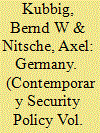

|
|
|
|
|
| Publication |
2005.
|
| Summary/Abstract |
From 1998 until it ended in 2005, the Social Democratic-Green coalition government rejected an explicit position on the necessity of a global or regional European shield, signalling scepticism towards such plans. At the same time the Schröder/Fischer cabinet, after an intense debate, was in favour of developing the tripartite MEADS system for the protection of soldiers deployed in out-of-area activities. The major missile defence-related issues examined in this article suggest that the changing identity of Germany as a trading power is in the final analysis the most credible explanation for these choices. In accordance with its greater stress on being a politically sovereign/more assertive country, the Federal Republic of Germany mutated during the Schröder/Fischer era from being a reluctant exporter of security to being a selective one. With this important exception, the missile defence-related decisions made in the Schröder/Fischer era do not support the conclusion that missile defence in general has become a stable and important element of the self-understanding of Germany and of its foreign policy.
|
|
|
|
|
|
|
|
|
|
|
|
|
|
|
|
| 9 |
ID:
072805


|
|
|
|
|
| Publication |
2005.
|
| Summary/Abstract |
With hard security issues in general and WMD proliferation in particular at the bottom of public security priorities, Hungary has no intrinsic interest in missile defence. As the most problematic of NATO's new members, it also is among the least responsive to external influences. This article examines the tendencies for Hungary's possible participation in the missile defence programme under the United States. After a short introductory overview of Hungarian foreign and security policy, the broader context of the missile defence debate is analysed, including the general Hungarian approach towards WMD, the current state of the Hungarian armed forces, and the preliminaries of Hungarian participation in the missile defence system. The article concludes that lack of publicly available information is among the main reasons why there is currently no real debate on missile defence issues in Hungary.
|
|
|
|
|
|
|
|
|
|
|
|
|
|
|
|
| 10 |
ID:
072813
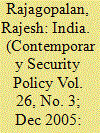

|
|
|
|
|
| Publication |
2005.
|
| Summary/Abstract |
India has been pursuing missile defences for a decade. Its missile defence programme is determined more by political than military imperatives, and it appears to be driven primarily by concerns about the threat posed by Pakistan's missile force, with little direct consideration of China. There is little indication that Indian decision-makers have thought through the kind of missile defence architecture that is needed for this emerging requirement, or the political implications of deploying a missile defence system. India's democratic polity has had little influence on decision-making on missile defences, though this is by itself not unusual since strategic policy has rarely invoked much interest or debate in India. But missile defences also sit uneasily with or even contradict other aspects of India's nuclear doctrine, and these contradictions have not yet been addressed.
|
|
|
|
|
|
|
|
|
|
|
|
|
|
|
|
| 11 |
ID:
072814


|
|
|
|
|
| Publication |
2005.
|
| Summary/Abstract |
This article deals with the evolving Israeli policy on the issues of ballistic missile threat, and missile defence. The Israeli perception of the missile menace has changed drastically as a result of the 1991 Gulf War. This led to a set of decisions by the Israeli leadership which have resulted in the allocation of enormous resources to accelerate the development and deployment of the Arrow anti-tactical ballistic missile system. To analyse these decisions and their implications, the unique Israeli decision-making process is described. The article outlines this process as part of the Israeli strategic culture, and examines the roles, and influence of the main actors in the process. Israel can be described as a relatively liberal democracy in all aspects of civilian life. But, on issues of national security and defence, the country is a limited and restricted democracy.
|
|
|
|
|
|
|
|
|
|
|
|
|
|
|
|
| 12 |
ID:
072816


|
|
|
|
|
| Publication |
2005.
|
| Summary/Abstract |
Japan has been a leading partner of the United States in the area of ballistic missile defence. It has already decided to deploy US-developed anti-missile systems, and has started preparation for actual deployment. The government of Japan has come this far without bringing about fierce controversy or strong opposition. The author argues that the changes in national identity, urged on by the public's growing recognition of the changing strategic environment surrounding Japan, including the increasing North Korean threat and the rise of China, have, somewhat coincidentally, facilitated efforts by the bureaucracy to lead the remarkable development of ballistic missile defence cooperation
|
|
|
|
|
|
|
|
|
|
|
|
|
|
|
|
| 13 |
ID:
072806
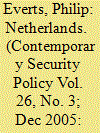

|
|
|
|
|
| Publication |
2005.
|
| Summary/Abstract |
The issue of theatre-range missile defence is approached by the Netherlands' government primarily as an issue of 'technical' adaptation of defensive capabilities against potential or already existing threats, made possible by new technologies. This approach is generally shared by parties and interest groups across the political spectrum, and this helps to explain why the issue is not controversial beyond the small circle of those who are involved in arms acquisition processes and setting priorities within the available budgets. As long as decisions in this area can be successfully framed as merely a consequence of established general policies, they can also be depoliticized. The interest of the military in this area stems from the strong desire to remain a reliable junior partner of the United States, and the decision to be one of the few countries in Europe to acquire Patriot PAC-3 systems should be seen in this light.
|
|
|
|
|
|
|
|
|
|
|
|
|
|
|
|
| 14 |
ID:
072811
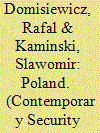

|
|
|
|
|
| Publication |
2005.
|
| Summary/Abstract |
The United States has not yet invited Poland to join its missile defence programme. Yet Poland is one of the countries most likely to welcome such a request. Major elements of the Polish political system are positively inclined to missile defence, not because the country faces direct WMD threats, but because it would further cement security relations with Washington. In so far as Poland worries about WMD threats, its fears are directed not at regional proliferators, but at Russia.
A Polish response to a potential offer would take into consideration a number of strategic interests. First, Warsaw's participation in missile defence should bring added value to international security, buttressing the defensive capacity of NATO and the European Union. Political relations with neighbours cannot suffer as a consequence of missile defence engagement. Second, it should help deepen bilateral and multilateral strategic ties with the United States. Third, missile defence must be treated as but one facet of the adaptation of global institutions and means of response to new security threats and challenges. A relative paucity of debate on missile defence in Poland can be explained by the weakness of the non-governmental policy community, the strong role of the executive branch in relation to the legislative in security and defence, and the technical orientation of this problématique as well as strong public and elite support for trans-Atlanticism.
|
|
|
|
|
|
|
|
|
|
|
|
|
|
|
|
| 15 |
ID:
072817


|
|
|
|
|
| Publication |
2005.
|
| Summary/Abstract |
This article examines the parameters of the current Russian debate over missile defence. The analysis recognizes the influence that the nuclear superpower legacy is still exercising over Russia's world view and security policies. This legacy is shown to provide the central perspective for Russia's assessment of the United States' global missile defence programme and the search for strategies addressing the new security situation brought about by its development. The article analyses the official pronouncements and the broader public discussion on missile defence issues. It examines the factors responsible for the narrow public scope of the debate, but concludes with the assertion of its relevance to the pressing issues of Russia's social and political life. It also looks at the potential for political actualization in the course of the ongoing process of identity formation.
|
|
|
|
|
|
|
|
|
|
|
|
|
|
|
|
| 16 |
ID:
072818


|
|
|
|
|
| Publication |
2005.
|
| Summary/Abstract |
Despite a long legacy of allied relations, former South Korean President Kim Dae Jung decided not to join the American missile defence programmes. President Roh Moo Hyun has chosen to continue this policy. The choice is controversial but generally very popular among the people of South Korea even though North Korea has been at the forefront of global WMD proliferation, developing nuclear weapons and deploying large numbers of long-range ballistic missiles. As a result, a gulf has emerged between American global strategy and South Korean local politics since President George W. Bush opted to develop missile defence to meet North Korea's increasing missiles threats. These rival choices represent one of the clearest clashes between Washington's 'Offensive Realism' and South Korea's 'Wounded Nationalism'. Although missile defence issues have not been a major part of the public dispute, the general atmosphere has direct effects on missile defence diplomacy. Consequently, the issue is a major symbol of the estrangement between the Republic of Korea and the United States.
|
|
|
|
|
|
|
|
|
|
|
|
|
|
|
|
| 17 |
ID:
072812
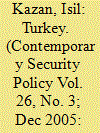

|
|
|
|
|
| Publication |
2005.
|
| Summary/Abstract |
In explaining Turkish missile defence policy-making, old theoretical stand-bys like regime type and the Military-Industrial Complex fall short. They leave unexplained major questions such as why the issue of missile defence has not been debated on the same scale compared with many other security issues, and why the issues of Theatre Missile Defence and National Missile Defense have been perceived very differently. The acquisition of a TMD system is seen as a legitimate Turkish priority, whereas the American NMD project has led to scepticism, both publicly and officially. It is concluded that post-Cold War geopolitical factors, as well as security perceptions, foreign and defence policy culture, and military alliance relations all play an important role in Turkish missile defence policy-making.
|
|
|
|
|
|
|
|
|
|
|
|
|
|
|
|
|
|
|
|
|